Manchester-based sustainable technology firm TWM Traffic Control Systems has been chosen by Aberdeen City Council to upgrade the granite city’s pedestrian crossing network.
The deal secured by TWM was made possible after Aberdeen Council secured funding to upgrade its pedestrian safety infrastructure. It will result in nearly 100 crossing points being upgraded to the DayBright enhanced HALO units. These are designed to provide a safer and highly visible crossing point.
TWM has previously worked with Aberdeen City Council to install ultra-bright LED DayBright Belisha beacon zebra crossings in locations throughout Aberdeenshire. The company has also installed the part-time 20mph speed limit signs around Aberdeen’s schools,
Chris Rayner, TWM national sales manager, said: “After working with Aberdeen City Council to improve safety on the roads around schools, it has been a brilliant opportunity to review pedestrian safety across the entire city.
“TWM provides solutions that are smart, safe, and sustainable; and this project ticks every box. Utilising a fully integrated, energy-efficient LED Belisha beacon crossing solution should prove to be a valuable upgrade to the network, and we look forward to monitoring the impact over the coming months as we continue our work with Aberdeen Council to make the city safer.”
This latest partnership will see additional pedestrian safety measures installed across the region. TWM added the new DayBright zebra crossings will not only be safer, but also are more intelligent than existing crossings due to its solution integrating with Aberdeen’s Central Management Systems (CMS).
The DayBright crossings form part of a city-wide smart solution. A design modification of the product, which was manufactured specifically for Aberdeen Council, allows easy integration with its existing CMS nodes. It is possible to integrate TWM solutions with various smart city platforms to allow comprehensive control of all traffic infrastructure.
TWM added it will take the team time to manufacture and commission the crossings for all locations, with an aim to be fully up and running by the end of November. The beacons will be mains-powered for guaranteed performance and, once activated, can be monitored through the council’s CMS.





